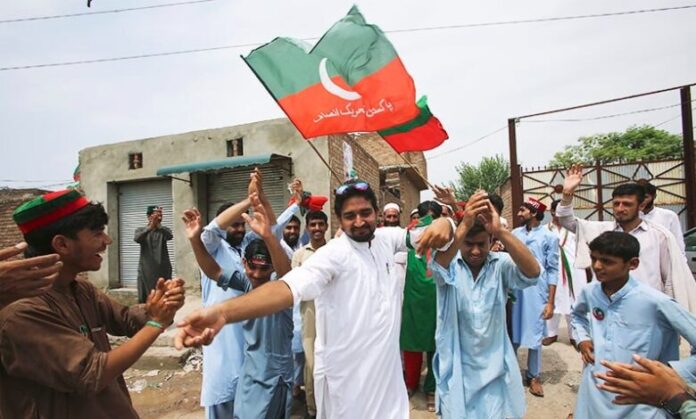
Kaif Afridi
As the Election Commission of Pakistan officially declared the commencement of general elections throughout the country, political parties have kicked into high gear, launching comprehensive political campaigns that encompass rallies, corner meetings, and workers’ conventions.
In Khyber Pakhtunkhwa, major political players have initiated their election campaigns, with the Jamiat Ulema-e-Islam standing out as particularly active. While it’s premature to predict the outcome of the popular and general elections, there is a noticeable trend of individuals from other political factions aligning themselves with the Jamiat Ulema-e-Islam in Peshawar.
On the recent Friday of November 17, Jamiat Ulema-e-Islam orchestrated a substantial rally at Peshawar’s Wazir Bagh ground. The event witnessed the participation of hundreds of individuals, including notable figures like Haji Umar Khan and Malik Noor Rehman from the Awami National Party, PTI’s Ramzan Afridi, and various other political dignitaries. The rally served as a platform for hundreds of workers to join the ranks of Jamiat Ulema-e-Islam.
Also Read: Taliban’s Opium Ban Sparks Crisis: Fields Destroyed, Prices Soar
Wazir Bagh, traditionally considered a stronghold of the Awami National Party, has a historical association with the party in this constituency. Despite ANP’s historical dominance, PTI secured National Assembly seats in the 2013 and 2018 general elections. However, Samar Haroon Bilour, wife of the late Haroon Bilour, made history by winning the by-election and becoming the first woman to clinch a general seat election in Khyber Pakhtunkhwa.
Is Governor Ghulam Ali active for Jamiat?
According to Awami National Party’s provincial spokesperson and former member of the provincial assembly, Samar Haroon Bilour, many administrators and officials leaving the party to join other political entities were individuals who had previously left the Awami National Party, primarily due to their aspirations for provincial tickets, which were not granted. She noted that since Haji Ghulam Ali assumed the role of governor, he has maintained communication with their party workers.
However, Samar Haroon Bilour expressed skepticism about the motives behind the political activities at the Governor House, suggesting that those who have switched allegiances might be driven by the lack of ticket allocations. She emphasized that the departure of these individuals is unlikely to impact the Awami National Party, asserting that the party still enjoys strong support in the constituency. Samar Haroon Bilour refuted Jamiat’s claim of hundreds joining their ranks, stating that only a small number, around 3 to 5 workers, have made the shift. She highlighted the transient nature of individuals switching parties based on ticket availability, asserting that such practices weaken the political landscape.
Haji Sher Rehman, a long-standing party worker with a substantial vote bank, recently joined the PML-N after contesting the Peshawar Mayoral election on the Awami National Party ticket in Samar Bilour’s constituency. His move to PML-N occurred two months ago through the efforts of PML-N provincial president Engineer Amir Muqam.
Assessing Political Dynamics in Khyber Pakhtunkhwa
In an exclusive conversation with TNN, Senior Journalist Lehaz Ali offered insights into the current political landscape in Khyber Pakhtunkhwa, emphasizing that Pakistan Tehreek-e-Insaf (PTI) remains the predominant party in the province. However, he expressed concerns about the upcoming general elections, suggesting that PTI candidates might face harassment, arrests, and obstacles in organizing events. Despite these challenges, Ali noted that recent workers’ conventions indicate PTI’s continued popularity in the region, surpassing attendance at meetings held by Maulana Fazl ur Rehman in Peshawar and Bilawal Bhutto Zardari in Mardan.
Ali speculated about the political scenario, asserting that Jamiat Ulema-e-Islam (JUI) stands as the second most popular party in the province. He predicted that coalition parties would likely form the government in the next election, with Maulana Fazl ur Rahman and potentially Awami National Party joining the alliance. Ali highlighted the current election environment, where rival parties are holding rallies against each other, positioning PTI in the opposition.
Unconventional Choices in JUI’s Candidate Selection
Responding to a question, Lehaz Ali observed that the Awami National Party, despite being an established political entity, faces leadership challenges in Peshawar, attributing this to the aging of key figures like Alhaj Ghulam Ahmad Bilour. The absence of robust senior leadership has led to party workers aligning with other political factions.
Regarding JUI’s political strategy, Ali noted that although the party operates on a platform of religious politics, it makes unconventional choices in candidate selection. Notably, the candidates they endorse are not necessarily religious scholars or Maulvis, showcasing JUI’s political adaptability and garnering acceptance among the electorate.
Addressing Maulana Fazl ur Rehman’s relationship with the establishment, Ali acknowledged a positive rapport but indicated that the unfolding political landscape would ultimately determine which party assumes power in the region.

